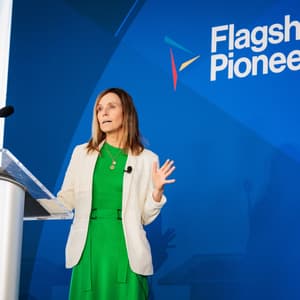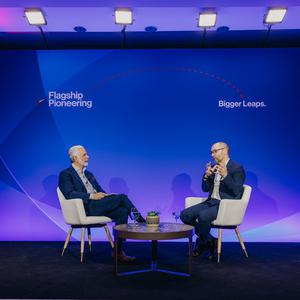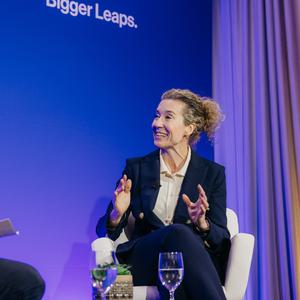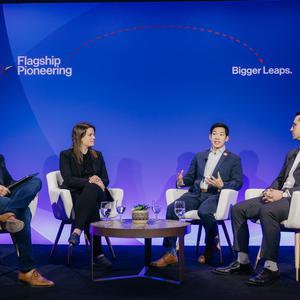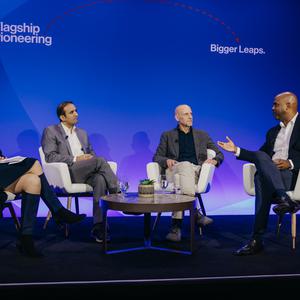Flagship Pioneering Origination Partner Molly Gibson is a scientist-entrepreneur leading the origination and growth of new pioneering platform companies. Molly has spent over seven years at Flagship fostering innovation at the confluence of artificial intelligence (AI) and biology, including co-founding Generate:Biomedicines. We sat down with her to learn more about her professional and personal pursuits.
You are one of four new Origination Partners who focus on originating and growing Flagship companies. Tell me about your expectations and goals for the new position?
I'm excited to continue to keep doing what I love — originating and building new platforms with some of the most brilliant, humble, and kind people I know. But thinking about this more broadly, I truly believe we build better teams and, ultimately companies, when we have people of all backgrounds, experiences, genders, and ethnicities around the table. My goal is to better understand those dynamics and commit to real impact in increasing diversity more deeply on my team and broadly across our companies.
On top of being an Origination Partner, you are also the co-founder and Chief Innovation Officer of Generate:Biomedicines. What is it like to watch a what-if idea you had grow into company garnering headlines for its $273M Series C raise, collaboration with Amgen, and a publication in Nature?
It's been a true example of cognitive dissonance — both completely surreal in that I feel like I need to pinch myself that the dream we set out to achieve over five years ago is becoming reality, combined with this deep feeling that it was inevitable all along. It’s hard to describe the level of deep belief I had for the unique insight and vision behind what became Generate, well before we had the evidence we have today. Overall, though, it's an incredibly humbling experience. I've learned so much through building Generate, especially from the people who have touched it throughout the years from the early days of founding and growing the company with Geoff von Maltzahn and Avak Kahvejian through to today with our CEO Mike Nally and the rest of the amazing leadership team at the company.
Generate:Biomedicines has an impressive Board of Directors, which notably includes Nobel prize winner Frances Arnold, Moderna CEO Stéphane Bancel, and the former CEO of Harvard University endowment Jane Mendillo. What have you learned from these and other Board members?
It has been an absolute honor to work with this group of individuals. It's hard to necessarily point to just one thing, but an overarching theme is how to identify and think critically about the most important problems in the face of extreme uncertainty. I've seen each of them exhibit this superpower at different moments, watching them cut through all of the noise and get to the thing that matters the most and focus on it. It's a skill that I feel I'm constantly learning from each of them and honing myself.
Flagship recently published an essay with Origination Partner Lovisa Afzelius that described the three strategic principles she believes can ensure AI and biology integrate to the fullest potential. What have you learned as you’ve seen these two fields become further intertwined during your career, and are there any principles you are guided by in your own work?
Some of the earliest insights we had at Generate are that machines could learn new statistical properties of biology and extrapolate and generalize to new hypotheses. In that case, we're specifically interested in the molecular machines of nature or proteins. But what's become clear is that the hypothesis is even more generalizable than we thought. What I'm curious to understand is just how far does that go? Is it generalizable to all of science? What about to the scientific method? These are the types of questions that I'm interested in finding the answer to today.
You’ve reflected that one of the reasons you’ve spent over seven years at Flagship is because you stand “shoulder to shoulder with brilliant people with shared values” working toward a better future “knowing you might be completely wrong.” What might you be wrong about and how do you stay motivated to keep pursuing a better future despite lingering uncertainty?
To give you a little history, this was from a mission statement of purpose that we crafted together with Flagship General Partner Geoff von Maltzahn. This was from very early on in my time at Flagship, and it took a long time to refine the specific words in that statement. So long that we often joke about it, but it’s really shaped my thinking over the years. What I've learned to appreciate most was the deep importance of standing shoulder to shoulder with brilliant people with shared values. If that's missing, the rest of the statement feels empty. But, to get back to your question, everything we do is uncertain, and we are constantly making hypotheses about the future that might be wrong. But what keeps you going is: what if you're right? If you're right, is the world a better place? If so, it's worth trying.
When you are not founding companies, you are actively involved in initiatives that encourage science outreach and education in K-12. Why has it been important for you to get involved?
This comes back to ensuring the future of science is diverse and people of all backgrounds have opportunities. In order to influence that future, you have to start by focusing on people when they are young. But on a more selfish level, I love watching a kid discover something new and that is becoming even more real as I'm watching my own kids explore and rapidly take in the world around them.


